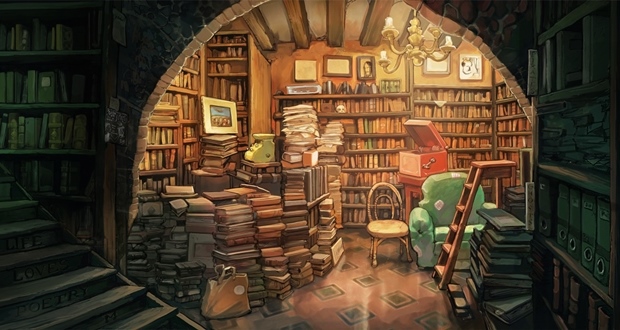When you think of Alcatraz (the prison it was, not the tourist attraction it has since become), you imagine a terrible place that you wouldn’t really want to visit – certainly not one where you would expect to find a light-hearted drama set. 1954: Alcatraz plays an unusual balancing act between being a Lucasarts-style cartoon adventure game and a somewhat violent, decision-driven title more akin to something like The Walking Dead. It ends up being a strange end product, but one that possesses many strong features. Set – not surprisingly – in 1950’s San Francisco, the game revolves around a husband and wife duo, separated by the confines of the titular iconic prison.
Joe has been incarcerated for his part as the getaway driver in an armed robbery, but ended up taking the fall for the entire crime. Playing both as Joe and his wife Christine – being able to hot-switch from one to the other whenever you like – you have to uncover the truth about what happened in the robbery, while all the while trying to get Joe off the so-called inescapable Alcatraz island. The setting and atmosphere of the era are both re-created quite well, despite the fairly simple style of the game, and it really immerses you in the period. Unfortunately, the story never manages to really reach the heights of drama you would hope for from a crime yarn, and that is a slight let-down. You never quite feel like there is enough pay-off for all of the set-up.

1954: Alcatraz is a straight-forward point and click adventure for the most part, and therefore story and character development are paramount. Luckily, Joe and Christine are both very likeable characters, despite their situation, and you want to see them succeed. What makes them more interesting though, is that throughout the game you have choices to make that will effect their relationship with one another. For example, you could choose to dig deeper into a rumoured affair that Joe had in the past while playing as Christine, or you could succumb to the temptation of another gal while playing as Joe.
These choices are part of what makes 1954: Alcatraz stand out above other run-of-the-mill adventure games, with the overall state of their relationship having a bearing on which ending you get. If you are loyal and honest, you are much more likely to get a happy ending than if you play suspiciously, for example. There are several different endings, but the other big difference between this and the majority of point and click adventures is that many of the puzzles or situations in the game have several solutions. This is a very rare feature in point and click titles and it is refreshing to see.
Unfortunately many of the puzzles that allow for multiple solutions don’t have any major impact on how the game develops, but this feature does allow you to feel like you can play the game your own way to an extent. You can resort to violent tactics, or choose to avoid confrontational situations. There are a few choices that will have a major impact for certain characters, as well as having many “bad” choices that you can make – but these invariably lead to a Game Over situation, rather than a satisfactory conclusion.

Another unique idea is that some of the puzzles you undertake are completely optional. You could choose to investigate several situations a bit further, if you wanted to find out more and dig a little deeper, but that is left down to the individual player, and further adds to the personalised feel of each play-through. Most of the game consists of straight-forward inventory-based puzzling and conversation trees, like most classic adventure games. This is all handled in a very straight-forward manner and gamers will quickly find themselves at home.
Despite offering choice and some quasi-action sections, this isn’t a title where you will need quick reflexes; rather you need to be quick-minded, and thankfully 1954: Alcatraz hasn’t succumbed to the recent trend for including in-game hint systems. There is a hotspot locator if you choose to use it, and most puzzle solutions are sign-posted to an extent (whereby if you keep speaking to everyone enough, they will drop subtle hints) but none of the puzzles are massive head-scratchers, and even inexperienced adventurers are unlikely to be stumped for too long.
The art design is a combination of hand-drawn backgrounds and 3D character models, and on the whole this works quite well. Many of the characters are quite well-modelled and stylised to fit the “Beat” culture of the time, but there are some who are just a bit too plain or angular, meaning that they stick out a little too much and detract from aesthetic. The same could be said for the animation, which is often a bit too jerky. If you didn’t know better, you’d be forgiven for thinking 1954: Alcatraz was a few years older than it is.

The sound design is infinitely more successful however, with some very strong voice acting. The entire cast is pretty well-chosen, with each voice being very distinctive and helping inform players a lot about that character – be they a slimy ladies man, a seedy gangster or a vicious prison inmate. They of course also help sell both the drama and the sense of humour in the game, and help you empathise with the two leads. The strong voice work is complemented further by the 1950’s style music, including the very impressive fully-sung opening theme, which really sets the tone of what to expect for the rest of the game.
VERDICT: It is strange to find an adventure game that you actually want to play through a second time right after completing it just to see what you could have done differently. Point and click games have notoriously low re-playability, so 1954: Alcatraz is unlike most of its contemporaries just for including such bold ideas as multiple solutions and narrative choice. We can forgive the title for not having mind-blowing graphics, as it does well to re-create its 1950’s setting regardless, through strong sound design and a great sense of atmosphere. The puzzles are not especially taxing and you won’t spend ages in the game world, but it is an interesting adventure to get lost in for a while.

GOOD. A game that scores 7/10 is worthy of note, but unworthy of fanfare. It does many things well, but only a few of them incredibly well and, despite a handful of good qualities, fresh ideas and solid mechanics, it fails to overwhelm.
Review code provided by publisher.







